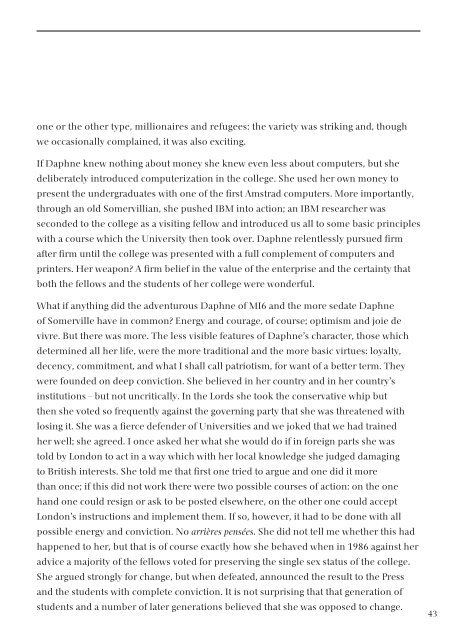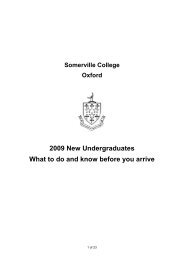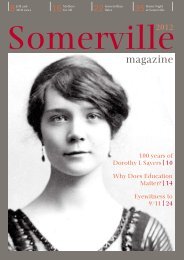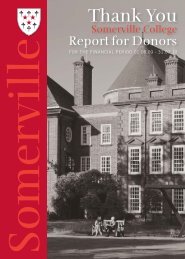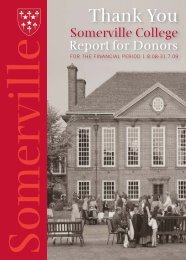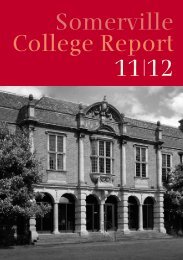Daphne Park Memorial book 3_3.indd - Somerville College
Daphne Park Memorial book 3_3.indd - Somerville College
Daphne Park Memorial book 3_3.indd - Somerville College
You also want an ePaper? Increase the reach of your titles
YUMPU automatically turns print PDFs into web optimized ePapers that Google loves.
one or the other type, millionaires and refugees: the variety was striking and, thoughwe occasionally complained, it was also exciting.If <strong>Daphne</strong> knew nothing about money she knew even less about computers, but shedeliberately introduced computerization in the college. She used her own money topresent the undergraduates with one of the first Amstrad computers. More importantly,through an old Somervillian, she pushed IBM into action; an IBM researcher wasseconded to the college as a visiting fellow and introduced us all to some basic principleswith a course which the University then took over. <strong>Daphne</strong> relentlessly pursued firmafter firm until the college was presented with a full complement of computers andprinters. Her weapon? A firm belief in the value of the enterprise and the certainty thatboth the fellows and the students of her college were wonderful.What if anything did the adventurous <strong>Daphne</strong> of MI6 and the more sedate <strong>Daphne</strong>of <strong>Somerville</strong> have in common? Energy and courage, of course; optimism and joie devivre. But there was more. The less visible features of <strong>Daphne</strong>’s character, those whichdetermined all her life, were the more traditional and the more basic virtues: loyalty,decency, commitment, and what I shall call patriotism, for want of a better term. Theywere founded on deep conviction. She believed in her country and in her country’sinstitutions – but not uncritically. In the Lords she took the conservative whip butthen she voted so frequently against the governing party that she was threatened withlosing it. She was a fierce defender of Universities and we joked that we had trainedher well; she agreed. I once asked her what she would do if in foreign parts she wastold by London to act in a way which with her local knowledge she judged damagingto British interests. She told me that first one tried to argue and one did it morethan once; if this did not work there were two possible courses of action: on the onehand one could resign or ask to be posted elsewhere, on the other one could acceptLondon’s instructions and implement them. If so, however, it had to be done with allpossible energy and conviction. No arrières pensées. She did not tell me whether this hadhappened to her, but that is of course exactly how she behaved when in 1986 against heradvice a majority of the fellows voted for preserving the single sex status of the college.She argued strongly for change, but when defeated, announced the result to the Pressand the students with complete conviction. It is not surprising that that generation ofstudents and a number of later generations believed that she was opposed to change.43


